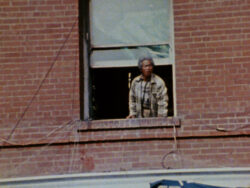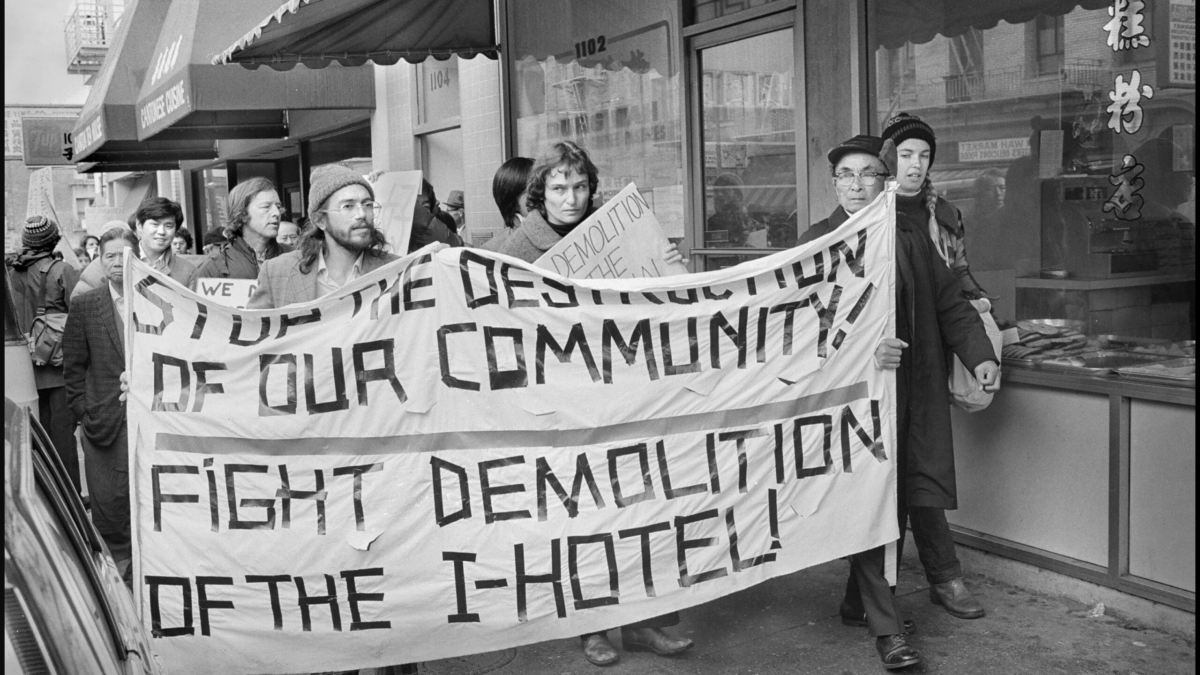Editor’s Note: “The Fall of the I-Hotel Postscript” originally screened at AAIFF85. It is a documentary that follows the San Francisco Filipino community’s resistance against the systemic destruction of Manilatown, including the forced eviction of 50 elders from its International Hotel.
It is an ACV Classic that is re-screening at AAIFF46.
Caroline Cabading, Executive Director of the Manilatown Heritage Foundation, wrote the following postscript
As the executive director of the Manilatown Heritage Foundation, as well as the distributor and restoration producer of the remastered “The Fall of the I-Hotel,” it is my pleasure to write a few words about this important film, which will be screened at the 2023 Asian American International Film Festival 40 years after its original release.
I’m happy to say that the local community support that ensued after its release in 1983 resulted in the opening of a new International Hotel complex in 2005 on the site of the original “I-Hotel.” This complex includes the 104-unit International Hotel Senior Residences, an affordable housing complex, and the International Hotel Manilatown Center, a community-based multipurpose gathering space that features performances, visual art work, and educational workshops honoring the both the legacy of the I-Hotel and Historic Manilatown, and the creative voices of today’s Asian Pacific Islander (API) community.

A Manilatown barbershop in the original film. (Image Credit: Curtis Choy/The Fall of the I-Hotel)
Our neighborhood may no longer be that vibrant, 10-block village of Filipino barber shops, restaurants, pool halls, and nightclubs, but our Center still holds space for this village’s memory. Manilatown is in the heart, after all, and that heart is still beating strong here in San Francisco’s Chinatown, along with our annual August 4th I-Hotel Eviction Commemoration event, Historic I-Hotel Walking Tours, and a museum featuring artifacts from both the struggle for the I-Hotel and Manilatown’s history. The Center also stands as a fresh and very current statement of today’s community. Our gallery features the work of today’s API visual artists and performers, and we now have an educational hub that teaches Philippine ancestral culture. At the I-Hotel Center, you can learn how to play Maguindanaoan kulintang, weave Kalinga textiles on a traditional backstrap loom, and speak the language of the Manilatown Manongs: Ilokano.
And YES, you can also view “The Fall of the I-Hotel,” which loops as a permanent exhibit in our Center! Director Curtis Choy honored us with the stewardship of his film in 2018, and it’s been our pleasure to have been distributing the film for five years now. The job of cleaning and subtitling the most pristine copy of the 16mm film in 2022, as well as optimizing its color and sound and digitizing it into 4K, was a true labor of love. Viewed continuously by students of Asian American Studies since its release in 1983, “The Fall of the I-Hotel” not only documents the struggle to save the I-Hotel, it provides an overview of Filipino American history.

Curtis Choy. (Image Credit: Curtis Choy/The Fall of the I-Hotel)
This is not just a story about old men in an old building, but of multiple tragedies: ethnic communities redeveloped out of existence, housing gobbled up by realtors, the shabby treatment of the elderly, and the betrayal of American ideals learned in the Philippines by its American pioneers. For today’s Asian Pacific Islander community, this struggle still stands as an historic moment where we chose to determine our own destiny in a remarkable 10-year period in time. On top of that, for the community, it was not a singular struggle: Concurrently, we rose up at the Third World Liberation Movement strikes at San Francisco State University and UC Berkeley that would birth our Schools of Ethnic Studies, the Anti-Vietnam War Protests, and the Anti-Marcos Protests–and from these movements rose a legacy of Asian American Art Activism and a national consciousness of Asian American identity.
Optimizing “The Fall of the I-Hotel” was a beautiful journey of collaboration with the UCLA Asian American Studies Archive, who lent us their 16mm print and audio files, and the support of a Mellon Foundation Community-Based Archive grant that allowed us to work with the best post-production house in California to complete this work, Burbank’s FotoKem. Thanks to the supervision of Director Curtis Choy, we now have a visually stunning restoration of a film that is preserved for our community in its best format. As an Ilokano Filipina, it was also my joy to personally transcribe the Ilokano accents of the Manongs. Subtleties of meaning were captured through this hand transcribing process that never came through aurally, and I would find myself constantly breaking into tears as the clarity of their words came to life for the first time despite having “listened” to the film dozens of times.

A resident of the original I-Hotel. (Image Credit: Curtis Choy/The Fall of the I-Hotel)
The true importance of this film being screened today in 2023–by at least two generations of APIs who were not even born when the I-Hotel’s tenants were all evicted in 1977–is simply that our struggle as a community in the areas of racial injustice, affordable housing, and anti-Asian violence are still very much a part of our reality in this country. In the words of the American Association of State and Local History, we need to “redouble [our] efforts to preserve and interpret history that challenges assumptions, that uses evidence to trace continuities and mark changes, and that helps us to understand causation, especially in this core American story of racism and the struggle for justice. History organizations have a duty to address contemporary issues and can offer examples of historical resilience and creativity of people rising to meet challenges in the past.”
“The Fall of the I-Hotel” continues to stand as one of our community’s most powerful documentations of historic API resilience.

